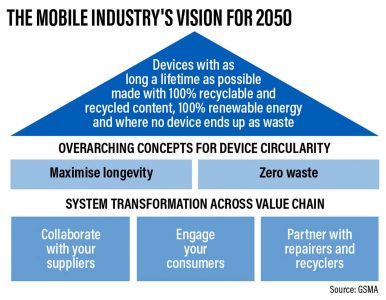Mobile and digital technology can help cut about 40 per cent of the required carbon dioxide emissions within the industrial world’s top emitters in the next 10 years, London-based industry body GSMA has said.
If deployed at scale, digitalisation, considered a key enabler of the decarbonisation transition, can help the manufacturing, power and energy, transport, and building sectors to reduce their carbon footprint, GSMA said in its Mobile Net Zero report for 2023.
The sectors collectively account for about 80 per cent of global emissions.
“For any country or company to get to net zero by 2050, reductions of 50 per cent will be required in each successive decade leading up to that point,” the report said.
“The next 10 years to 2030 are crucial. With global carbon dioxide emissions now at approximately 53 gigatonnes (GT), the required cut this decade is around 26GT,” it added.

Global carbon emissions hit record highs in 2022, with no sign of the falls needed to curb climate change, a Global Carbon Project study found.
Scientists have said that there is now a 50 per cent chance that global temperature rises will hit the crucial climate target of 1.5°C above pre-industrial levels in less than a decade, the study said.
Mobile connectivity, the Internet of Things, artificial intelligence and other digital technology are being used by enterprises to lower their own energy use and emissions, the GSMA said.
“As digitisation continues to grow across the economy, the energy reduction aspect of advanced technology will increasingly become a unique selling point for telcos, equipment vendors and tech companies,” it said.
However, the cost of investment, integration complexities and a lack of information on returns are considered to be the main challenges in trying to achieve the goal, it said.
The GSMA is also pushing for a circular economy within the mobile device sector which relies on the supply of finite resources, causing one of its biggest environmental impacts.
A circular economy is an economic system that focuses on reducing the extraction of natural resources, minimising waste and regenerating natural systems.
“Circularity is a fast-emerging trend to boost rates of reuse, remanufacture, refurbishment, recyclability and recycling” in the mobile device market, the GSMA said.
“Existential challenges such as climate change, waste, pollution, resource scarcity and biodiversity loss can be mitigated by moving to a more circular economy.”
In addition, extending the lifetime of all smartphones in the world by a year could eliminate up to 21.4 million tonnes of carbon emissions annually by 2030, which is equal to removing more than 4.7 million cars off the world’s roads, the GSMA said.
Meanwhile, the growth of refurbished mobile devices — those that have been repaired and are being resold by manufacturers or retailers — is also supporting the sector’s sustainability agenda.
Its market value is projected to almost triple to more than $140 billion by 2030, from $50 billion in 2020, the GSMA said.
Samsung Electronics and Apple, the world’s two biggest mobile phone manufacturers, have both committed to introduce measures that will support measures to meet carbon-reduction goals by 2030.
Meanwhile, more telecom operators are tapping into renewable sources of energy to lower their overall emissions.
Globally, 24 per cent of the electricity used by operators in 2022 was generated from renewable sources, up from 18 per cent in 2021 and 14 per cent in 2020, the GSMA said.
“The time to act is now,” John Giust, the GSMA’s chief regulatory officer, wrote in the report.
“In countries around the world, we will continue to call for progressive policy from governments to build a regulatory environment that helps operators decarbonise, as well as recognising the power of connected digital solutions to help decarbonise other industries.”



